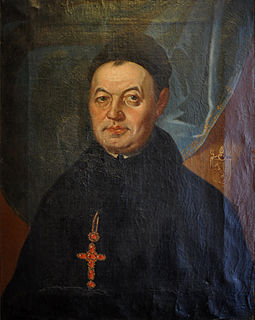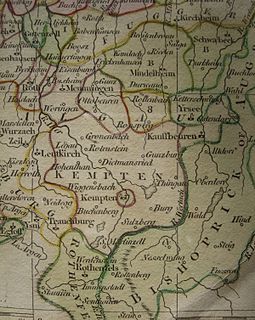See also
- Kempten railway station (disambiguation)
- Kempton (disambiguation)
- Kempten Abbey, an abbey and state of the Holy Roman Empire
Kempten is a town in Bavaria, Germany.
Kempten may also refer to:
Limburg or Limbourg may refer to:
Berg may refer to:

In the Holy Roman Empire, the collective term free and imperial cities, briefly worded free imperial city, was used from the fifteenth century to denote a self-ruling city that had a certain amount of autonomy and was represented in the Imperial Diet. An imperial city held the status of Imperial immediacy, and as such, was subordinate only to the Holy Roman Emperor, as opposed to a territorial city or town which was subordinate to a territorial prince – be it an ecclesiastical lord or a secular prince.

Swabia is a cultural, historic and linguistic region in southwestern Germany. The name is ultimately derived from the medieval Duchy of Swabia, one of the German stem duchies, representing the territory of Alemannia, whose inhabitants interchangeably were called Alemanni or Suebi.
Landsberg may refer to:

Stein am Rhein is a historic town and a municipality in the canton of Schaffhausen in Switzerland.
Imperial immediacy was a privileged constitutional and political status rooted in German feudal law under which the Imperial estates of the Holy Roman Empire such as Imperial cities, prince-bishoprics and secular principalities, and individuals such as the Imperial knights, were declared free from the authority of any local lord and placed under the direct authority of the Holy Roman Emperor, and later of the institutions of the Empire such as the Diet, the Imperial Chamber of Justice and the Aulic Council.

Bingen am Rhein is a town in the Mainz-Bingen district in Rhineland-Palatinate, Germany.

Kempten is the largest town of Allgäu, in Swabia, Bavaria, Germany. The population was about 68,000 in 2016. The area was possibly settled originally by Celts, but was later taken over by the Romans, who called the town Cambodunum. Kempten is the oldest urban settlement (town) in Germany.
Schönborn may refer to:

A Prince-abbot is a title for a cleric who is a Prince of the Church, in the sense of an ex officio temporal lord of a feudal entity, notably a State of the Holy Roman Empire. The secular territory ruled by the head of an abbey is known as Prince-abbacy or Abbey-principality. The holder, however, does not hold the ecclesiastical office of a Bishop.
Neuburg can refer to:

The Reichsdeputationshauptschluss, sometimes referred to in English as the Final Recess or the Imperial Recess of 1803, was a resolution passed by the Reichstag of the Holy Roman Empire on 24 March 1803. It was ratified by the Emperor Francis II and became law on 27 April. It proved to be the last significant law enacted by the Empire before its dissolution in 1806.

Princely abbeys and Imperial abbeys were religious establishments within the Holy Roman Empire which enjoyed the status of imperial immediacy (Reichsunmittelbarkeit) and therefore were answerable directly to the Emperor. The possession of imperial immediacy came with a unique form of territorial authority known as Landeshoheit, which carried with it nearly all the attributes of sovereignty.
Schaumburg is a district in Lower Saxony, Germany. Schauenburg is a municipality in Hesse

The Old Swiss Confederacy was a loose confederation of independent small states within the Holy Roman Empire. It is the precursor of the modern state of Switzerland.

The Princely Abbey of Kempten was an ecclesiastical principality of the Holy Roman Empire for centuries until it was annexed to the Electorate of Bavaria in the course of the German mediatization in 1803.

The Free Imperial City of Kempten was a Free Imperial City in the Swabian Circle.
Pappenheim-Allgäu was a statelet in the Holy Roman Empire that existed from 1444 until it was partitioned in 1494.